All the comicbooks I read in 2020
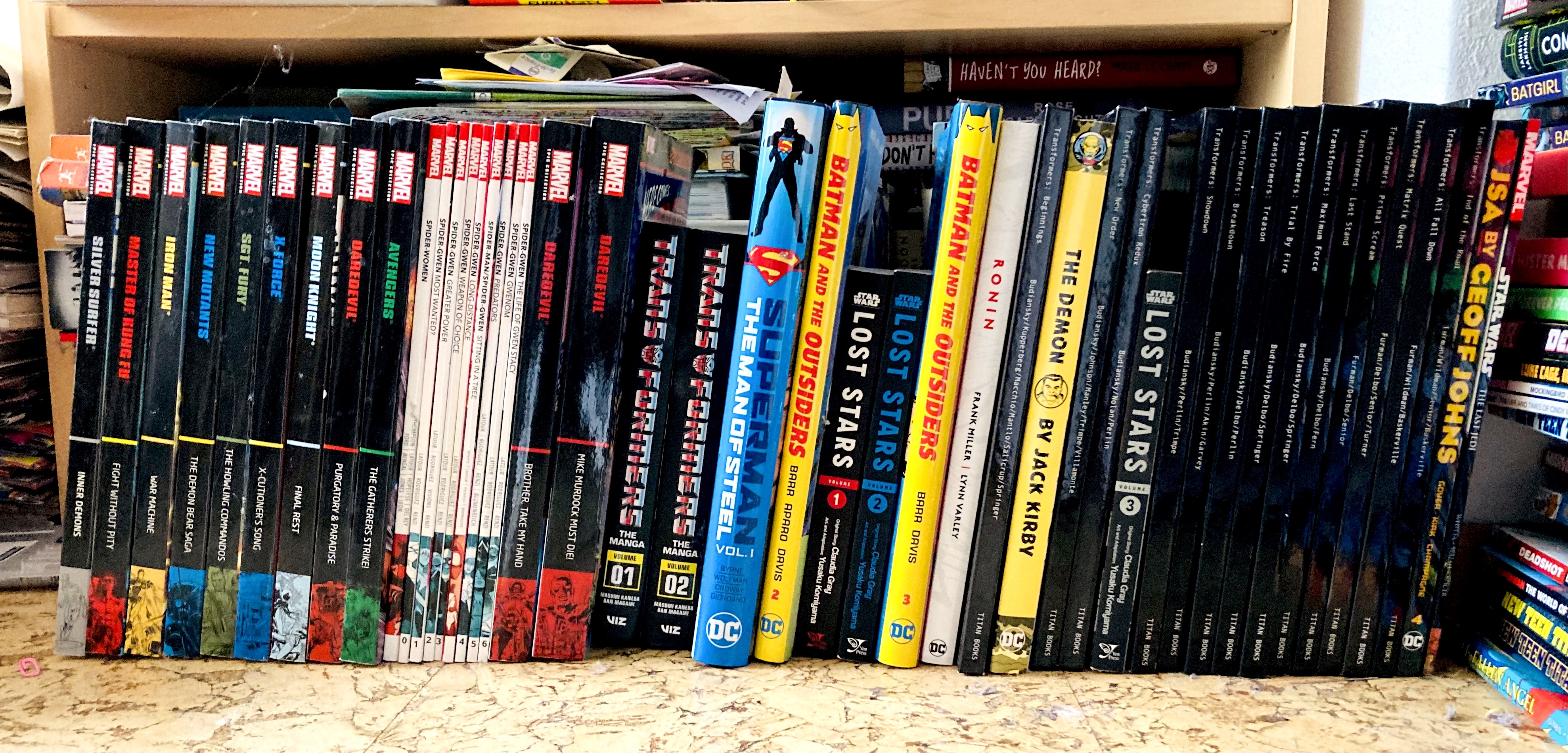
While 2020 was a bust for prose reading, it was the ideal year for some old-fashioned four-colour escapism.
This wasn't a big pivot, mind; even without COVID 2018-19 had been a miserable period in my career and I was well aware that there is comfort to be found in big fat collections of old comics. Marvel in particular, with the loner likes of the hapless Spider-Man, self-defeating Daredevil, and introspective Silver Surfer, fits this need for me very well.
Marvel's Epic Collections are god-send in this context, the successors to the old Essential line but this time in full colour. The first I read in 2020 was Silver Surfer: Inner Demons, kicking off the JM Dematteis run from the late 90s. He is, in many ways, the perfect writer for this character as originally portrayed, introspective and philosophical while concerned with the injustice of the world, not to mention finding himself in situations where Things Get Weird on a cosmic scale. Ron Garney didn't strike me as the obvious artist for this, but he does an amazing job conveying the Surfer's alienness on Earth and I wish he had drawn more issues. That said, I'm looking forward to the next volume with Jon J. Muth on art.
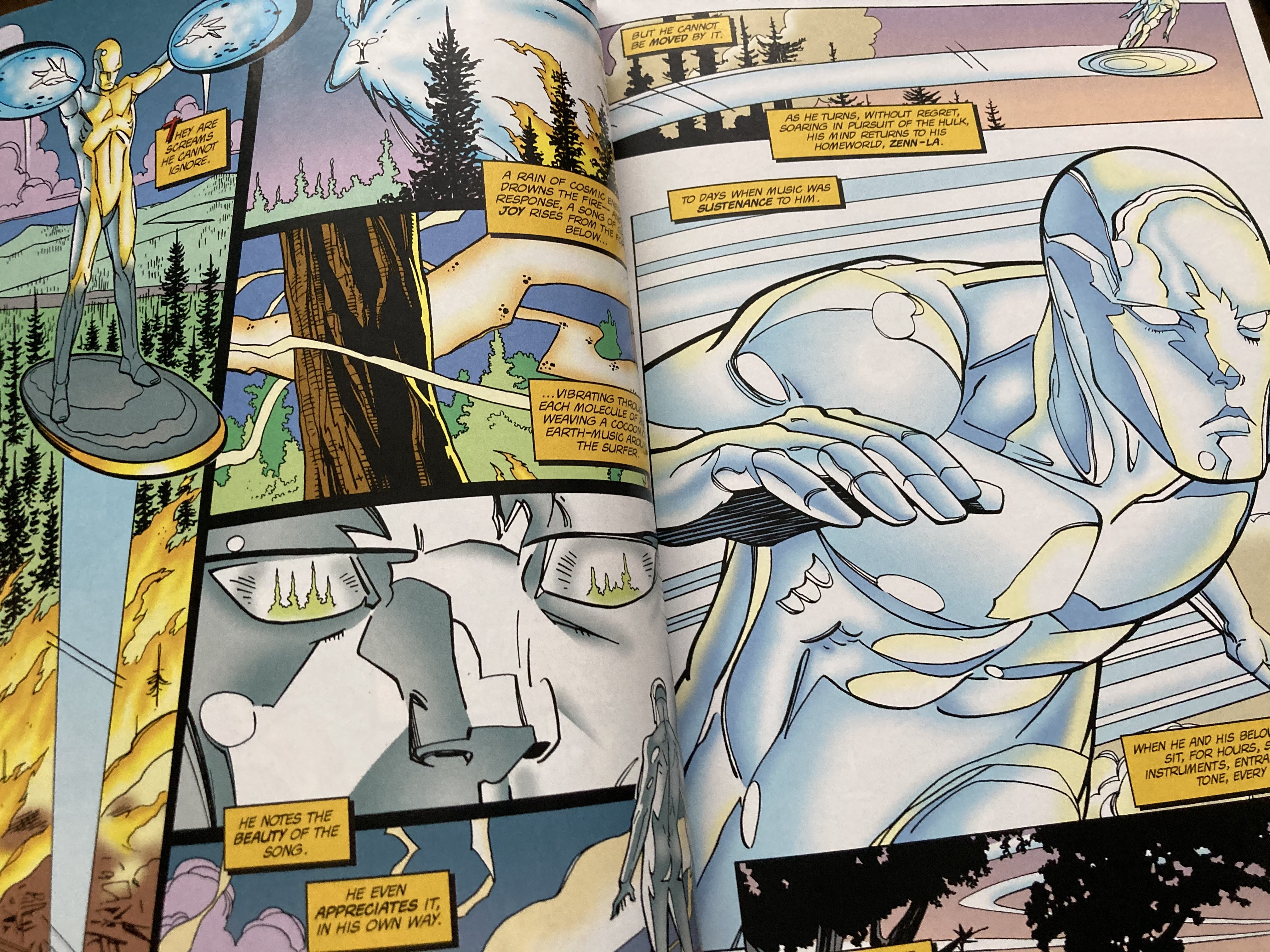
Another powerful fish-out-of-water loner prone to miserable introspection is Shang-Chi, star of Master of Kung-Fu: Fight Without Pity. He isn't the most compelling central character (Marvel Studios was right not to carry this into the movie, as well as the other more problematic aspects), but this is a comic where you're here for the action, as brilliantly rendered by Paul Gulacy.
Iron Man: War Machine collects comics directly from my childhood. It was during John Byrne's epic, underrated, run which directly precedes this volume that I got into reading Iron Man, which was my entry point to reading superheroes at all, and as such these are deeply familiar to me, reread over and over. This make it comforting, but hard to judge. It is from the first half of th 90s, often considered Marvel's nadir, but Len Kaminski is a decent writer who make use of Stark's situation as a tech billionaire (a much harder type to like in 2020), and British artist Kev Hopgood gives it a different feel to a lot of US comics of the time, so I'm willing to give it some benefit of the doubt.
Conversely, the next collection is me coming very late to what is widely considered a classic by a great creative team - New Mutants: The Demon Bear Saga. Chris Claremont remains on form as writer, his stories of the young mutant students almost as compelling as his peak on the main X-Men title while doing something quite different, but it's when Bill Sienkiewicz comes on as artist that it really takes off, and gets suitably weird. After decades of hearing about this it felt almost certain to disappoint. It didn't.
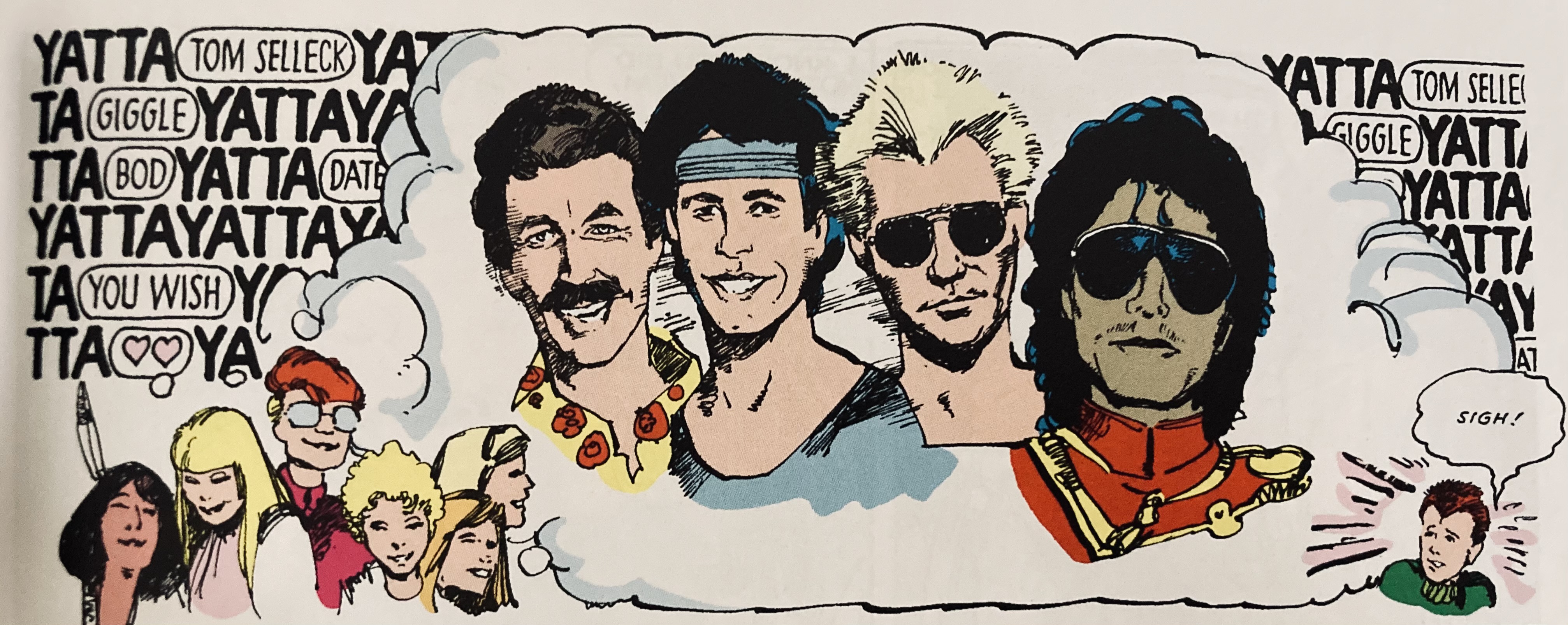
A few years back I was surprised by how much I enjoyed Lee / Kirby silver age Captain America comics. They're rarely spoken of as top tier Marvel of the time, but they were a lot of fun, and the glee with which Kirby had Cap beating on Nazis was palpable. This carries over well into Sgt. Fury: The Howling Commandos and its more down-to-Earth heroics. It isn't realistic, but it is more human-level, and doesn't flinch having main characters die, something rare in Marvel of this time.
At what some might consider the opposite end to a grounded, silver age Lee / Kirby classic is X-Force: X-Cutioner's Song, a collecting the 1992-93 X-Men cross-over which centred on the character may be the poster boy for 90s Marvel, Rob Liefeld's creation Cable and his mutant team X-Force. Like a lot of this much-maligned comic, which was the continuation and then reboot of the previously mentioned New Mutants, it is actually a lot of fun though. Fabian Nicieza is a good writer and there's art from the likes of John Romita JR, Greg Capullo, Andy Kubert, and Jae Lee. If this isn't your kind of thing this isn't going to convince you otherwise, but it's much better than often made out to be and hits close to a personal nostalgia sweet spot.
More uneven, but with some serious creative highs, is Moon Knight: Final Rest which collects the last of the original series from the 1980s. My interest waned in the second half of this with the departure of Sienkiewicz and then writer Moench, though Kevin Nowlan does a typically fine job on pencils, if for too brief a stint. Those few Moench / Sienkiewicz issues contain some fine work though, most notably the one-off story Hit It! about the cycle of violence, wonderfully illustrated, with the action punctuated by a child's drawings and accompanied by a jazz performance. It would be unfair to describe the rest of the book as bad, especially with the likes of Kevin Nowlan on art, but it is bound to suffer in comparison.
Daredevil: Purgatory & Paradise feels like a mid-90s watershed volume, bringing the character back to a more familiar status quo after the divisive excesses of DG Chichester's early 90s run. I enjoyed that period of Daredevil a lot, though it was starting to burn out towards the end, and a shift in creative direction was probably a good thing. It starts with JM Dematteis doing a rescue job, getting all the pieces back in the right places, but thankfully having the time to do it properly and with style. Unfortunately he doesn't then continue as regular writer, but after a couple of issues the fondly remembered brief run by Karl Kesel begins. It sits nicely alongside Marvel's 96/97 post-Onslaught creative revival with titles like Thunderbolts and Heroes for Hire, a conscious return to a more fun and upbeat tone. These stories haven't particularly stuck in my mind, but I do remember them being breezy and entertaining, and sometimes that's enough.
Sliding a bit further back into the 90s, Avengers: The Gatherers Strike! concludes Steve Epting's run as penciller on the early part of Bob Harras's long run as writer. It may not be highly regarded (aside from Epting's pencils, which are wonderful), but this is from the period when I first encountered Avengers comics at all - this is my Avengers, a mix of long-running plots with portentous end-of-the-world themes and soapy ensemble drama, the ideals Avengers for someone heading toward their teenage years in the early 90s. Back then I only saw it sporadically on the shelves of WH Smith, whichever random issues Comag had distributed, so having these epic collections to fill the large gaps (not to mention the conclusion of the story) after all these years is a big thing for me, and I mostly enjoyed it, especially the issues with Epting on pencils.
From there, my daughter dragged me closer to the present day by lending me her Spider-Gwen comics. I loved Into the Spider-verse, where Gwen was an outstanding character, and though these predate that film they are as close to its bold, dynamic, sugar-rush tone as is probably possible. They're also fully in the spirit of classic Spider-Man, with a hapless young heroine struggling with real-world problems, doing the right thing even when it is going to make everything so much harder. The multiverse aspect is well used - these stories take part in an alternate Marvel Universe, where Gwen Stacey gets the powers and Peter Parker dies young, but it isn't just an extended What If..?. There are occasional crossovers with the main MU which come with some clever little touches - vistors often comment on how soft drinks come with significantly more caffeine and sugar here, which is a neat bit of meta-commentary. The art, both pencils and colouring, is a perfect fit and highly distinctive - Robby Rodriguez's forced early retirement feels truly tragic. It does start to stumble a bit towards the end, but the early volumes still form a very impressive run of high quality, and the creative team comes up with a satisfying resolution at the end (that still left the character open for further use). Highly recommended.
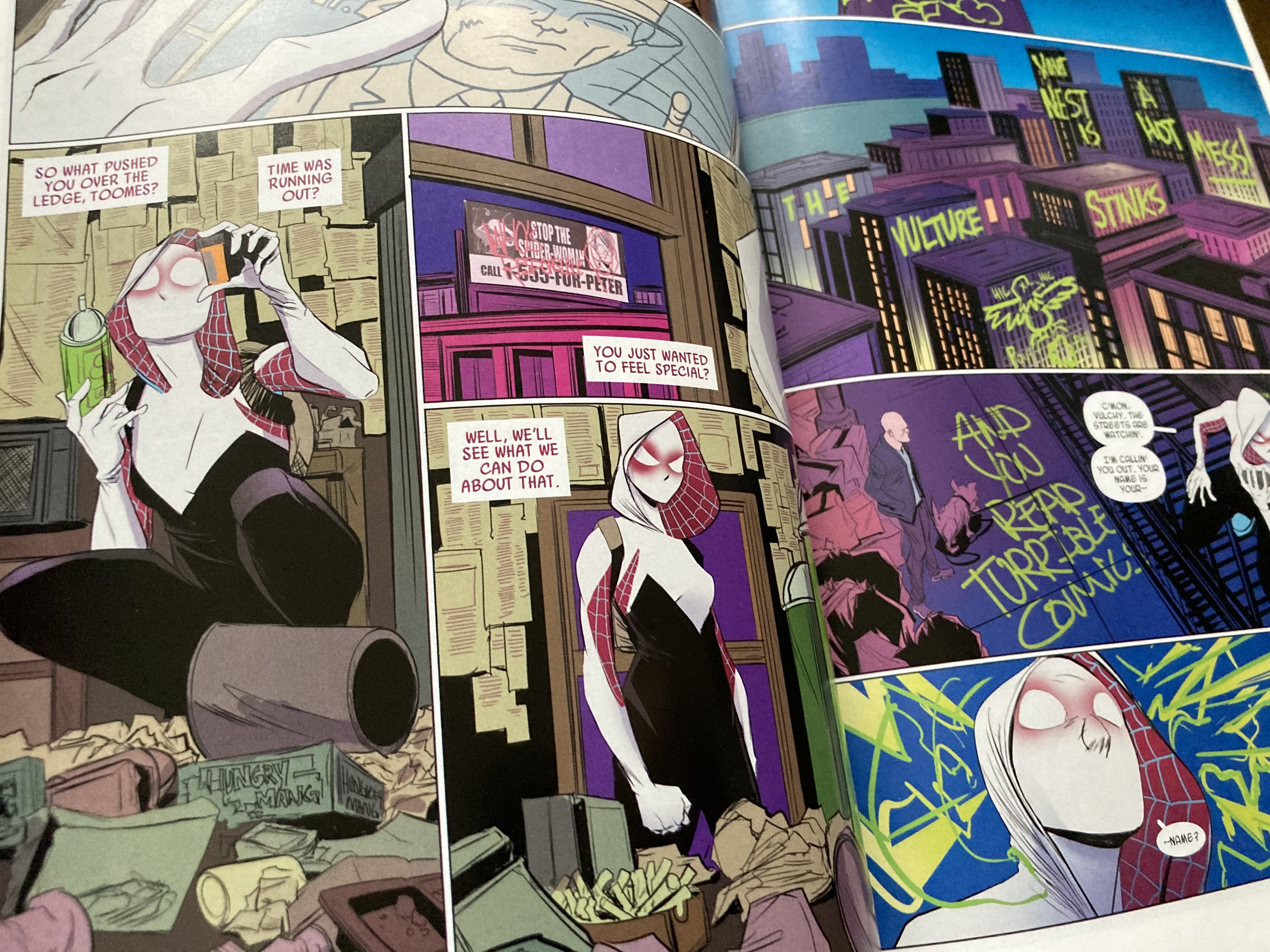
At the other end of Marvel history, another unashamedly fun comic that still put its title character through the wringer a lot is 1960s Daredevil, in this case in Brother, Take My Hand and Mike Murdock Must Die!. It's common received wisdom that before Frank Miller, Daredevil was nothing special. This is bafflingly wrong and narrow-minded. Silver Age DD, from the early Wally Wood issues through Gene Colan's long stint on pencils, is well-crafted, compelling, and fun, and while it may not offer the dark, brooding atmospherics of Miller it isn't afraid to hint at Matt Murdock's pschological problems, without needing to earnestly foreground them. Matt pretending to be his own twin brother Mike, then having Mike come out as Daredevil, to distract attention from himself is obviously a crazy idea - but the writing acknowledges that and plays with it, and manages to keep it working for a surprising number of issues for a comic of the time, and the ultimate conclusion isn't a neat and straightforward wrap-up. It's unlikely we'll ever know just how much of this was Stan and how much Gene, but there's a notable transition to Roy Thomas; at this point Gene's page layouts suddenly become much less dynamic, which suggests a stronger scripting hand at play, and is kind of sad to see. It remains compelling under Thomas though, and I'll be happy to get into the next volumes. There's also art from a Kirby-esque, very young, Barry Windsor-Smith in here who would go on to do amazing work with Thomas on Conan the Barbarian.
A sharp change of pace is Transformers: The Manga volumes 1 & 2, collecting the Japanese manga strips that promoted the toys in the 1980s. They are nothing special, very much superficially written stories to sell toys to kids, and as such stand in stark contrast to what we got in the UK. I've been curious about them for a long time though, and there's some nice art, especially in the colour pieces collected at the end. Mostly only interesting to fans, or possibly young children (but even they have many better options!).
I've never been a Superman fan, but I have long been a John Byrne fan, and am such a fan of him at his peak, both as writer and artist, that my apathy can be overridden and I can pick up a chunky hardcover like Man of Steel vol 1 and be completely drawn in. As I understand it, this is the post-Crisis on Infinite Earths reboot of Superman, Crisis being the event that wiped the continuity clean and allowed creative teams to modernise the characters and settings where it felt necessary. This turned out to be a bit of a recurring theme in Byrne's works, for better or (admittedly often) worse, but as a non-Superman fan for me this worked very well. It is very of its time, and if you're not a fan of Byrne this won't convince you otherwise, but I'm very glad I finally got round to it; if flew by, and so did the issues of other contemporary Superman titles which are mixed in for completeness.
From post-crisis Superman to pre-crisis Batman with Batman and the Outsiders, volumes 2 & 3, continuing the series in which Batman angrily quites the JLA and forms a team of superhero misfits. It sounds very out of character for those more used to a modern Batman, but Mike W. Barr makes it a lot of fun, and there is tremendous artwork firstly from stalwart Batman artist Jim Aparo and then from Brit penciller Alan Davis. A lot better than you would imagine from the concept.
Back in the realm of licensed properties in Manga form, my daughter pulled through for me again by getting me to read all three volumes of Star Wars: Lost Stars adapted from Claudia Gray's novel by Japanese writer-artist Yusaku Komiyama. Set mostly around the events of the original trilogy (with some Rogue One references thrown in) it tells the story of a boy and girl whose home world comes under Imperial rule and who end up on opposite sides, the boy joining the rebellion and the girl becoming a promising Imperial cadet. Like with the From a Certain Point of View short story collections, it's fascinating to see the big events of the films played out from other perspectives, and like with the short stories the implications of the destruction of Alderaan plays a big part. At it's core though it's a story of thwarted love between teenagers against a backdrop of fascism and space battles, and as such fits perfectly in both Star Wars and as a teen-targeted Manga. And it's always a pleasure to see classic Star Wars ships and locations drawn by a talented manga artist, there's something about those designs that really fits that style of rendering.
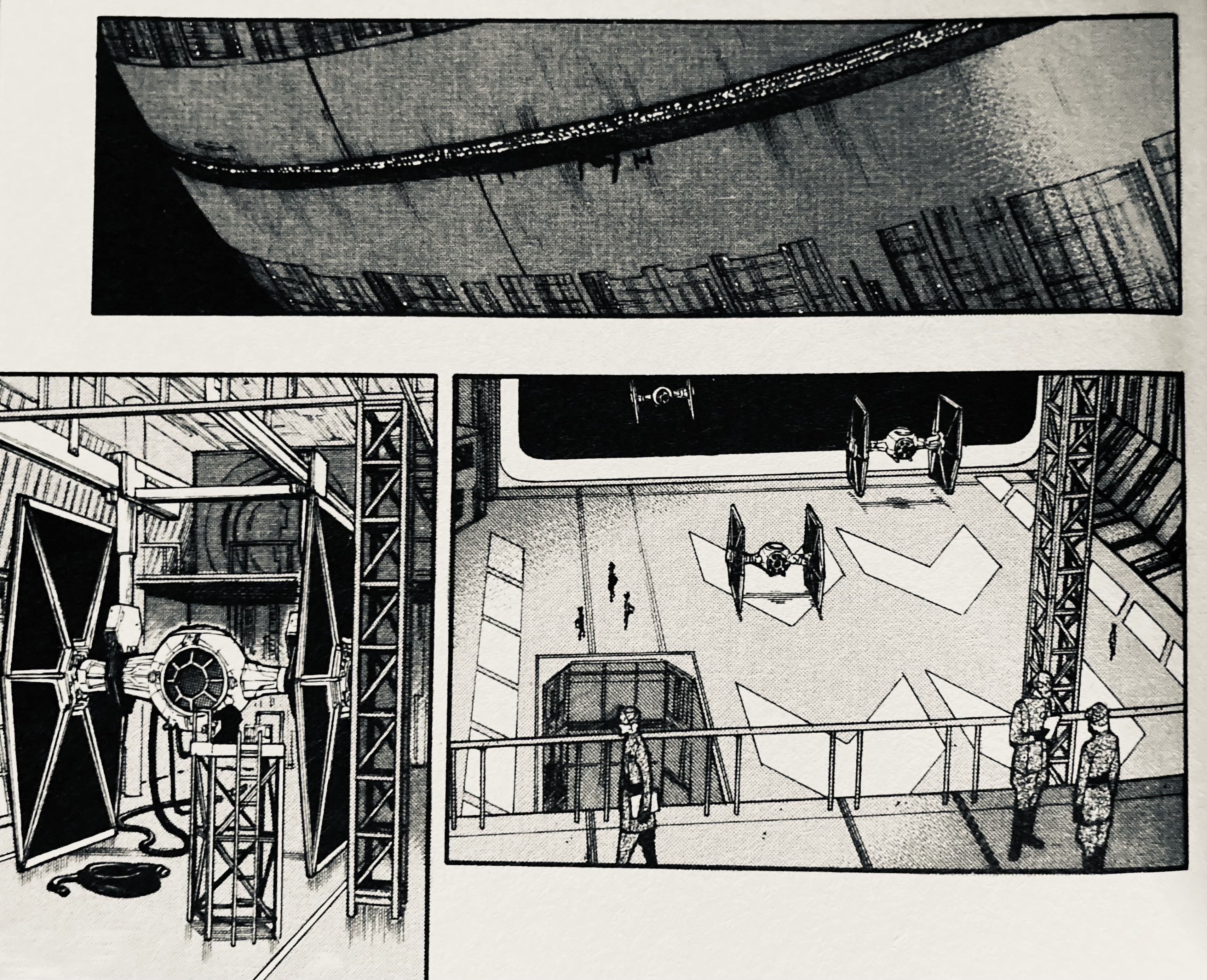
It's all too rare these days that I can come stone cold to something of a classic, which is what I managed to do this year with Frank Miller's Ronin. Though I was already long into comics by the time I read The Dark Knight Returns, it was DKR which tripped something in my head about what you could do both with superheroes and with comics and I fell in love with Miller's work, making it all the stranger that I never got round to Ronin until all these years later. Which is a shame, because I'm pretty sure if I'd read this as a teenager it would have blown my mind; as an adult it feels a bit slight, story-wise, but it's beautifully crafted and comes with a kick of nostalgia with its early 80s cyberpunk trappings. I can't imagine rereading it like I have so often DKR, but I can imagine pulling it off the shelf to leaf through and admire many times.
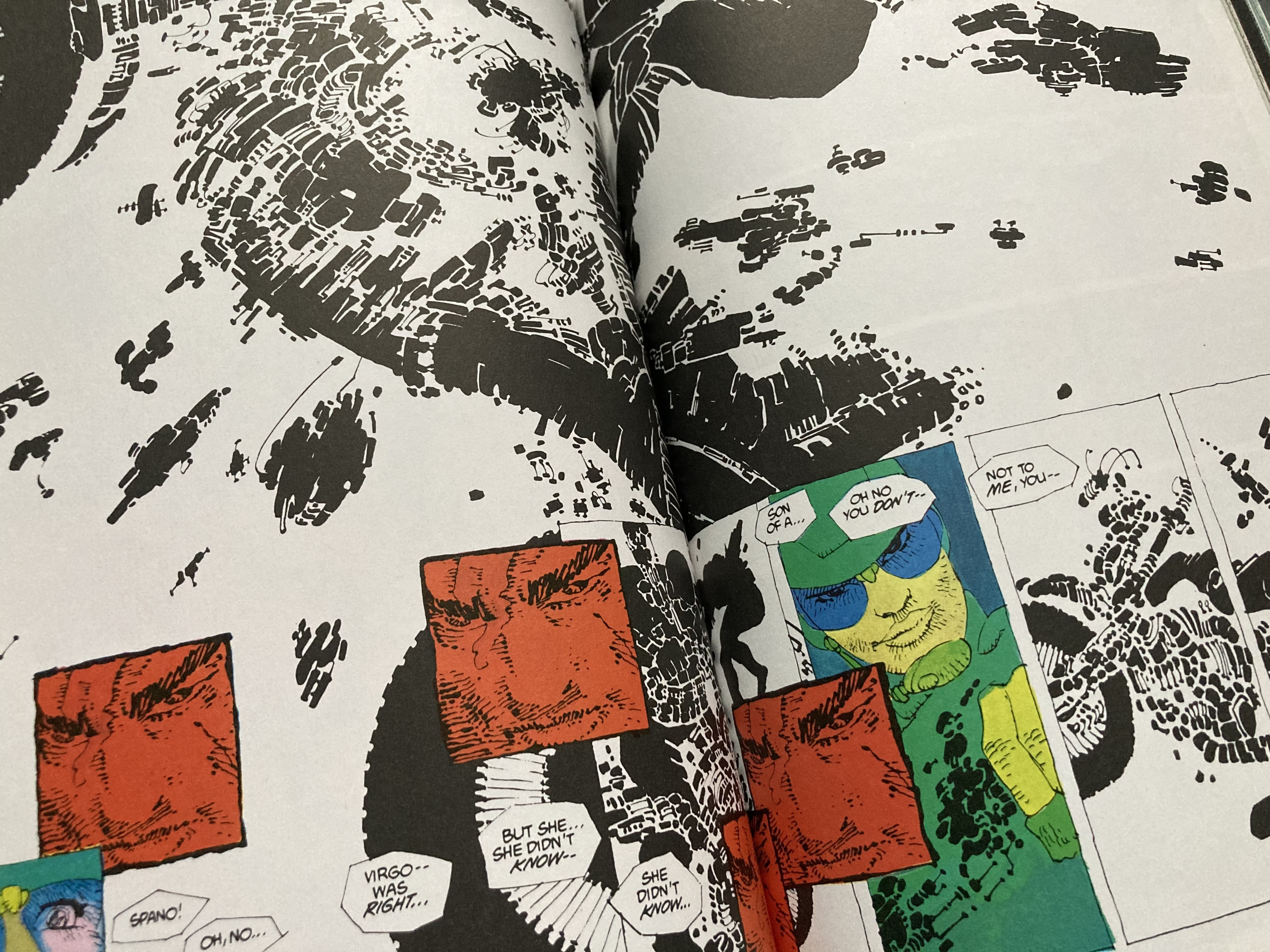
Nostalgia rarely kicks as hard for me as it does with 80s Transformers comics, and this year I did something new by reading the whole Marvel US run through without the UK issues in-between. I am a hardcore fan of the UK comic, where the writers and artists went far above and beyond anything they needed to when it came to filling the gaps between US stories to maintain the weekly publishing schedule, and am not sure I'd be so into reading comics today if it weren't for that. While well above the level of the Japanese Manga, the US comics seemed relatively slight to me, with simpler stories and art that had higher pressure from Hasbro to introduce new toys than the UK had. It turns out that, taken on their own merits, they make a fairly entertaining run, and the sharp shift in tone when UK writer Simon Furman takes over for the last couple of years (with UK artists Andy Wildman and Geoff Senior) is very jarring and almost unwelcome after the more whimsical, less pseudo-mystical-epic, US issues. The latter parts definitely work better if you've interleaved the UK stories, and I found myself unexpectedly warming to Budiansky's run taken by itself. Probably of little interest to non-fans or those with no nostalgia for these comics, but I enjoyed this read-through a lot.

Jack Kirby's The Demon collects the complete series which introduced Etrigan into the DC Universe during Kirby's fertile 70s period at the publisher. It is very, very Kirby, with beautiful bold art and slightly off-kilter, melodramatic stories (I firmly believe that however little you believe Stan Lee contributed to their partnership, he did at least have some restraining influence on Kirby's writing excesses). It's a bit more self-contained than the other work he did there at this time, and I really enjoyed it, but I can see how it wouldn't be for everyone.
A bit of a departure for me has been reading Geoff Johns' JSA in recent years. Aside from the classics or the occasional digression I've never been much into DC comics, so reading something as steeped in lore as this series may seem a bit surprising, but I've been really enjoying it. There are compelling stories at its core, exciting action, and excellent art in the Bryan Hitch-like cinematic way that was popular at the turn of the century. I've also never quite bought into the view that everything needs to be super-accessible and explained in every issue - I find that if the story itself is compelling then those details are like spice, adding rather than detracting. Apparently these collections have done poorly and there won't be a volume 5, which is quite disappointing.
Speaking of volumes of ongoing comics for which there will never be a satisfying follow up, I finished the year with Marvel's Star Wars: The Last Jedi adaptation. I don't think I need go on record again at how much I love this film, and how baffling the hatred leveled at it is for me, so I will stick to singing the praises of the comic. And it is very good; most Marvel movie adaptations and Star Wars comics hew close to a house style, but this has a more indie sensibility to the art, capturing the heavy atmosphere and quiet moments of the movie well. I believe this may also be the only Last Jedi-related media to give Admiral Ackbar his last words!
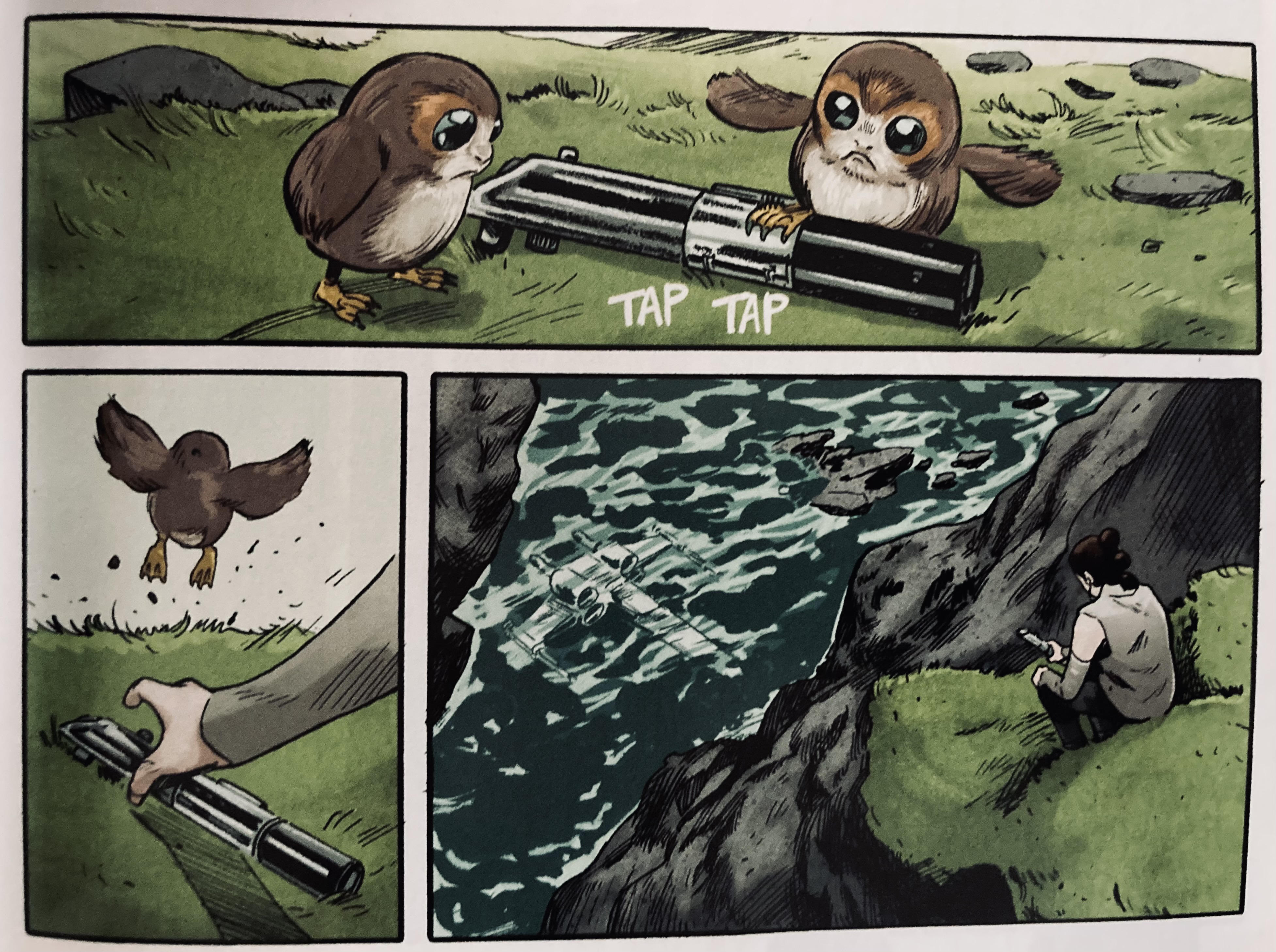
Looking back over what I read in 2020, it's a lot of comic books that it would be hard to recommend to anyone who wasn't already invested, whether by being into these kinds of comic already or having a strong nostalgic attachment. In a year where escapism was a priority this makes perfect sense, and I have no regrets.
If I were to recommend anything from 2020 for not-so-invested readers, it would be:
- Star Wars: Lost Stars
- Spider-Gwen
- Ronin
Kudos to my daughter for putting two of these three into my hands! As Yoda told us in The Last Jedi, we are who they grow beyond. And that's fine by me.
- Silver Surfer Epic Collection vol. 13: Inner Demons
- Master of Kung Fu Epic Collection vol. 2: Fight Without Pity
- Iron Man Epic Collection vol. 17: War Machine
- New Mutants Epic Collection vol. 2: The Demon Bear Saga
- Sgt. Fury Epic Collection vol. 1: The Howling Commandos
- X-Force Epic Collection vol. 2: X-Cutioner's Song
- Moon Knight Epic Collection vol. 3: Final Rest
- Daredevil Epic Collection vol. 20: Purgatory & Paradise
- Avengers Epic Collection vol. 24: The Gatherers Strike!
- Spider Women
- Spider-Gwen vol. 0: Most Wanted?
- Spider-Gwen vol. 1: Greater Power
- Spider-Gwen vol. 2: Weapon of Choice
- Spider-Gwen vol. 3: Long-Distance
- Spider-Man / Spider-Gwen: Sitting in a Tree
- Spider-Gwen vol. 4: Predators
- Spider-Gwen vol. 5: Gwenom
- Spider-Gwen vol. 6: The Life of Gwen Stacy
- Daredevil Epic Collection vol. 3: Brother, Take My Hand
- Daredevil Epic Collection vol. 4: Mike Murdock Must Die!
- Transformers: The Manga vol. 01
- Transformers: The Manga vol. 02
- Superman: The Man of Steel vol. 1
- Batman and the Outsiders vol. 2
- Star Wars: Lost Stars vol. 1
- Star Wars: Lost Stars vol. 2
- Batman and the Outsiders vol. 3
- Ronin
- Transformers vol. 1: Beginnings
- Jack Kirby's The Demon
- Transformers vol. 2: New Order
- Transformers vol. 3: Cybertron Redux
- Star Wars: Lost Stars vol. 3
- Transformers vol. 4: Showdown
- Transformers vol. 5: Breakdown
- Transformers vol. 6: Treason
- Transformers vol. 7: Trial by Fire
- Transformers vol. 8: Maximum Force
- Transformers vol. 9: Last Stand
- Transformers vol. 10: Primal Scream
- Transformers vol. 11: Matrix Quest
- Transformers vol. 12: All Fall Down
- Transformers vol. 13: End of the Road
- JSA by Geoff Johns vol. 4
- Star Wars: The Last Jedi